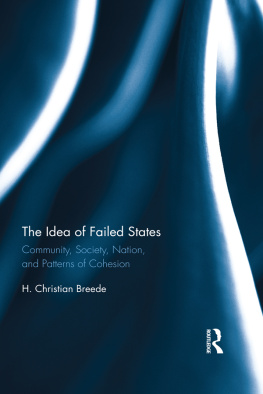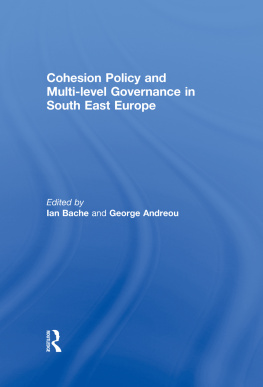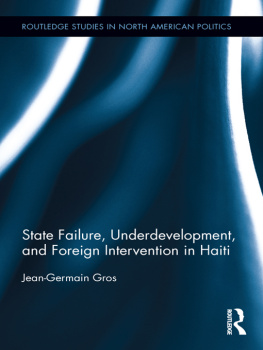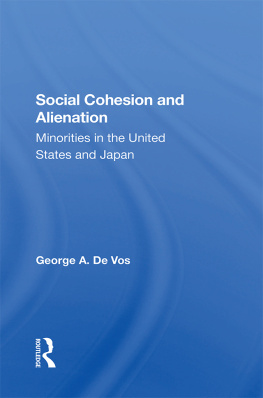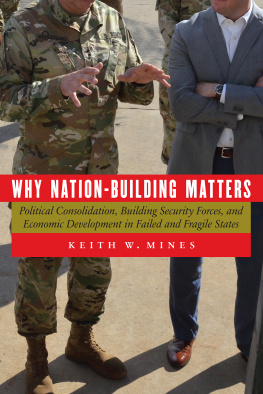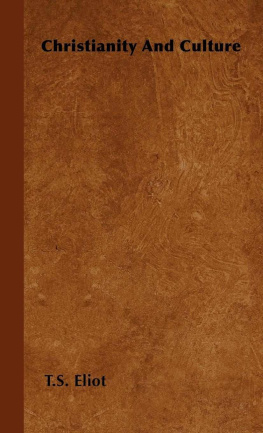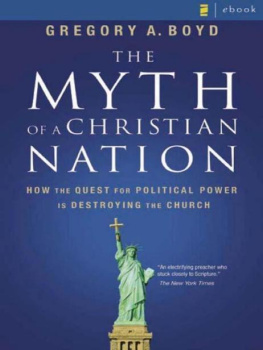The Idea of Failed States
A thought-provoking exploration of the social foundations of strong and weak states, wide-ranging in its scholarly sweep and enlivened by the authors direct experiences as a soldier deployed to Haiti and Afghanistan.
Roland Paris, University Research Chair in International Security and Governance, University of Ottawa
Why are some states able to deliver public services to their citizens while others cannot? Why are some states beset by internal conflict that leaves many impoverished? Much of what has become known as the failed states literature attempts to engage with these questions, but does so in way that betrays a particular bias, engaging in advocacy for intervention rather than analysis. The Idea of Failed States directly challenges existing thinking about conventional state strength as it finds that institutional approaches to state strength obscure as much as they reveal.
The question of why some states are strong and others weak has traditionally been addressed using measures of economic growth, resources, and quality of life. This book compares the dimensions of state strength characterised by community, society, and nation and uses social capital concepts to further illuminate them. Applying this approach across forty-two countries shows weak states exhibiting a consistent and unique patterns of relationships between community, society, and nation as well as equally consistent and unique relationships in strong states. A blend of theory and empirics, The Idea of Failed States present a new way to think about the state one that applies to both strong and weak alike.
This work should be of interest to students and scholars researching social capital, public policy, international development and security studies.
H. Christian Breede is an Assistant Professor of Political Science at the Royal Military College of Canada (RMCC) and a serving officer in the Canadian Armed Forces. Concurrent with this appointment, he is also a Deputy Director of the Centre for International and Defence Policy and a cross-appointed Assistant Professor of Political Studies at Queens University. He completed his PhD in War Studies at RMCC. Prior to his PhD studies, he served in a variety of command and staff positions within the Canadian Armed Forces as an Infantry Officer deploying to both Haiti (2004) and Afghanistan (20089). His research interests include state capability as it relates to international security and the connection between the soldier and the citizen.
First published 2017
by Routledge
2 Park Square, Milton Park, Abingdon, Oxon OX14 4RN
and by Routledge
711 Third Avenue, New York, NY 10017
Routledge is an imprint of the Taylor & Francis Group, an informa business
2017 H. Christian Breede
The right of H. Christian Breede to be identified as author of this work has been asserted by him in accordance with sections 77 and 78 of the Copyright, Designs and Patents Act 1988.
All rights reserved. No part of this book may be reprinted or reproduced or utilised in any form or by any electronic, mechanical, or other means, now known or hereafter invented, including photocopying and recording, or in any information storage or retrieval system, without permission in writing from the publishers.
Trademark notice : Product or corporate names may be trademarks or registered trademarks, and are used only for identification and explanation without intent to infringe.
British Library Cataloguing-in-Publication Data
A catalogue record for this book is available from the British Library
Library of Congress Cataloging-in-Publication Data
A catalog record for this book has been requested
ISBN: 9781138716391 (hbk)
ISBN: 9781315196879 (ebk)
Typeset in Times New Roman
by Apex CoVantage, LLC
To my family without whom this would not have been possible
To say that the puzzle of failed states has shaped my professional life may be a bit of an overstatement, but only just. I clearly recall in the fall of 2001, then an Officer Cadet at the Royal Military College of Canada, hearing about some airplanes hitting the World Trade Center. Like many on that bright and sunny Monday morning, I simply assumed that a private plane had bounced off the side of one of the towers odd, but by no means a major international event. As I returned to our dormitory from an early class, I walked into the common room just in time to see a Boeing 767 slam into the South Tower, the second passenger jet to do so that morning. I was frozen in disbelief at what I was seeing. What was once the realm of fiction had now become a horrifying reality.
The events of September 11, 2001 not only shaped foreign policy for many nations for the next decade, but also shaped my career as an officer in the Canadian Armed Forces, setting the stage for my deployment to Haiti in 2004 and then Afghanistan in 2008. Furthermore, it shaped the field of study I would follow into my graduate education and beyond. My work as a masters student at the University of New Brunswick from 2005 to 2007 was influenced by two things: first, by my observations that failed states posed a threat to international peace and security and second, by my impending deployment to Afghanistan in 2008 as a rifle company second-in-command with the Provincial Reconstruction Team in Kandahar. As a result, I had both an academic and a professional interest in the topic of state failure. Upon my return to Canada and my subsequent pursuit of a PhD, again at the Royal Military College of Canada, the topic of the failed state remained front of mind.
This book began as a dissertation, and although substantially revised since then, the core findings remain largely unchanged. Indeed, the idea that inclusive attitudes and perceptions are important for a strong and vibrant state is intuitive to say the least, and I am pleased to offer yet another collection of empirical evidence to support what many feel is a responsible view to hold in the first place. The more we welcome, and include, the stronger we all become. Truly, we are better together.
I say this is yet another as several works have made, and continue to make, this fundamental conclusion. In the pages that follow I refer to work by Daron Acemoglu and James A. Robinson, who very plainly argue that strong states come about through inclusive institutions. A more recent example, Thomas Friedmans latest book, Thank You for Being Late , makes similar conclusions. Accelerators such as the exponential growth of technology, changing climate, and the shift in what we value from stock of capital to flows of capital change our world in ever more complex ways. In short, we need to get along to get ahead.
However, despite these powerful claims and arguments, we are witnessing a troubling trend running through many democratic countries. Inequality, fear, and outright anger are threatening to undermine much of what makes democracy work. Indeed, trust, a central theme of this book, is being eroded by terms like fake news and alternative facts, to the point that we are turning against one another, fearful, rather than empowered, by our differences. Again, drawing on the vocabulary of this book, bonding social capital is Trumping (every pun intended) bridging social capital in places where this relationship was once reversed. As you will see from the conclusions of this book, this does not bode well for the stability of Western states.

